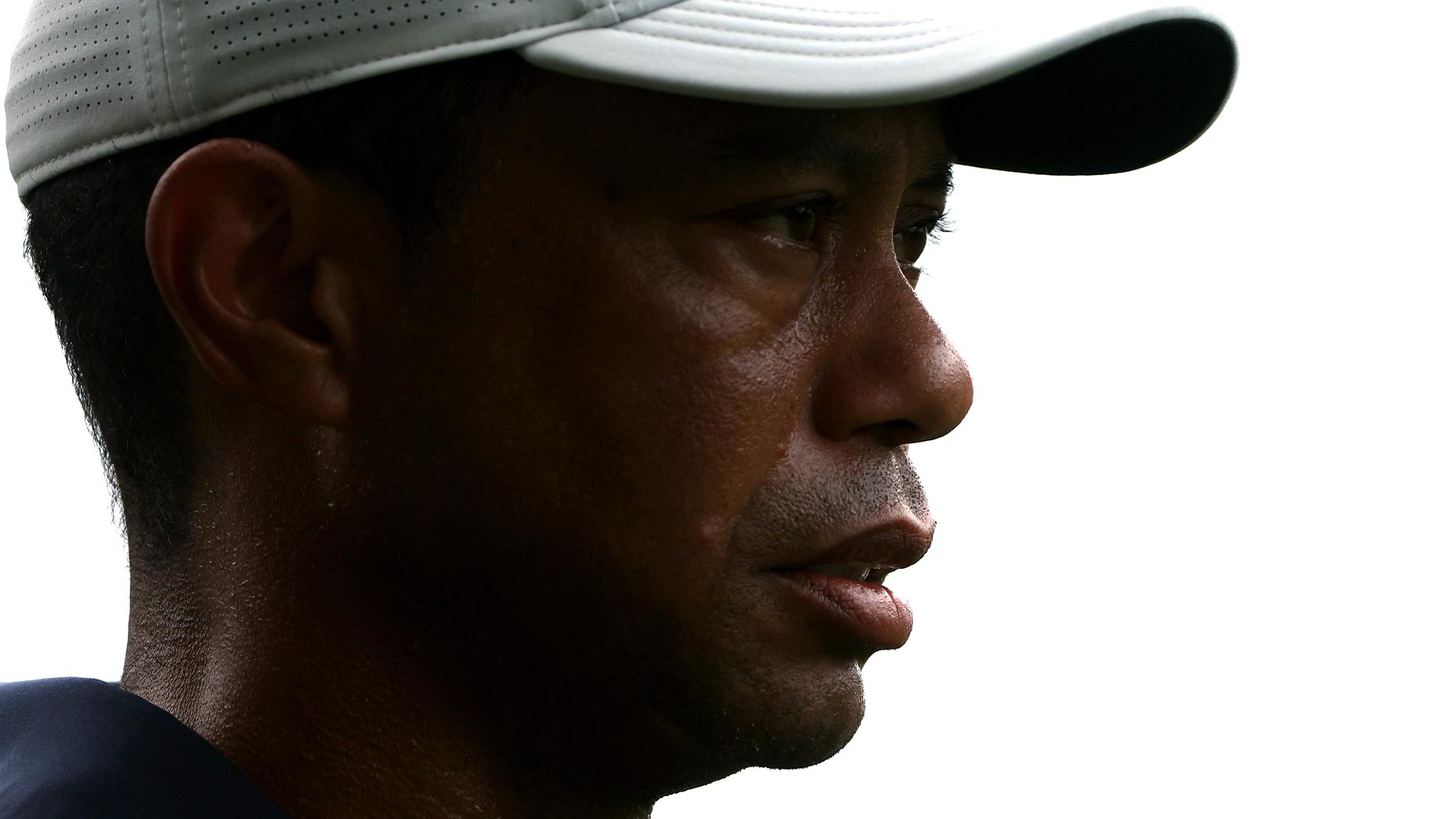
Tiger Woods’ words suddenly mean more than ever.
Getty Images
It is difficult to say if nerves were to blame for the sheen gracing Tiger Woods’ forehead on Tuesday morning, or if the source of the sweat was slightly more benign, like the humid 78-degree Bahamian air coursing through the interview room. (Likely the latter.)
But no one would blame Tiger if nerves were causing the greater-than-usual display of perspiration at his annual Hero World Challenge press conference, where the 15-time major champ returned to the sport on Tuesday morning. After all, this was the first time we’ve heard from him since taking on his new job as the player voice of the PGA Tour, which made Tuesday’s presser Woods’ de facto job interview for the golf world.
And job interviews are nervy, even for Tiger Woods.
You might remember how he wound up in this role: by filing a list of demands signed by more than 50 players to PGA Tour commissioner Jay Monahan, who later installed Woods officially as a sixth player director on the Tour’s advisory board and unofficially as de facto head of the Tour’s players. You might not remember that Woods’ only words then were a canned statement about his pride for the Tour and newfound faith in Monahan, and that nobody has heard from him since.
So when he arrived at the lectern for his opening salvo from the Hero World Challenge — a frequent spot of Woods comebacks over the years — it was telling that his focus appeared to be on his new gig. For the first time in at least a decade, the most interesting thing about Tiger Woods was not his golf game nor his return to major championship contention, but rather his newly-anointed position.
“We have to protect the integrity of our Tour and what that stands for going forward,” he said poignantly. “Trying to figure all that out in the past few months has been a very difficult task, but we have to protect what the Tour is for the players.”
Is Tiger ready for the role of Tour spokesman? His resume is certainly worthy. He is the face of the sport and the most famous player ever to grace a tee box. His combination of professional achievement and business acumen leaves him in an audience of one in the world of golf, and the weight of his voice among the playing class of the PGA Tour remains unparalleled. He is not just an obvious choice for this role, he is arguably the only choice.
But this is a different kind of job for Tiger, based not on his ability with a club in his hands nor a Nike swoosh on his chest but rather on his capacity to persuade and assuage; to hear and be heard. This job places Woods in an obvious golf leadership role for only the second time in his career (the 2019 Presidents Cup being the first), and will see him steer the players into the sport’s future, perhaps through a long-term agreement with the Saudi Public Investment Fund.
On the topic of the merger, Woods defended players with a mix of candor and cantankerousness. He acknowledged there wasn’t enough time for the players to settle every score, but remained furious about the backroom nature of Monahan’s initial agreement with PIF chief Yasir Al-Rumayyan, and about the Tour’s initial handling of the news. (Three times during the course of Tuesday’s presser, Woods used the same words to describe the agreement: that can’t happen.)
“I would say that my reaction was surprise, as I’m sure a lot of other players were taken back by what happened,” he said. “We were very frustrated with what happened and we took steps going forward to ensure that we were not going to be left out of the process like we were. So part of that process was putting me on the board and accepting that position.”
Monahan likely kept his job by virtue of capitulating to Woods’ demands, but Tiger’s message to the Tour contingent on Tuesday was clear: Monahan remains on thin ice.
“He understands what happened prior can’t happen again and won’t happen again,” Woods said.
In his role, Woods will ensure that is the case, wielding oversight into every Tour decision. The work will consume him, but he seems to know that, having seen it consume his good friend and predecessor, Rory McIlroy, from up close. McIlroy resigned from the board earlier this month, a surprise decision that had the unintended effect of clearing the runway for Woods.
“He was in contention almost every tournament he played in and he was the spokesman at the same time,” Woods said. “That was very difficult on him personally
and I totally understand it.”
Tiger will not have Rory’s playing schedule, a feat owed to a bum foot, ankle, leg, knee and back. He will also not have the work of the 2025 Ryder Cup captaincy weighing on his chest (at least, not yet). For now his only job is to serve the PGA Tour’s players, sometimes on the fairway but most prominently in the boardroom.
It was strange to hear Woods make the case for himself during his press conference from the Hero on Tuesday, considering he may already be the greatest player-advocate in the history of professional golf, but it was not hard to understand why he felt compelled to make it. This job could be Woods’ most important as a member of the PGA Tour, a role in which his decisions are likely to change the future of the sport. As he now seems to realize, the work of building a legacy is useless if you can’t manage to sustain it.
“I enjoy the fact that I’m able to make an impact differently than just hitting a golf ball,” Tiger said. “I made an impact on the PGA Tour for a number of years hitting a golf ball and doing that. I can have a lasting impact by doing what I’m doing, by being on the board and being a part of the future of the PGA Tour.”
No wonder he was sweating.








